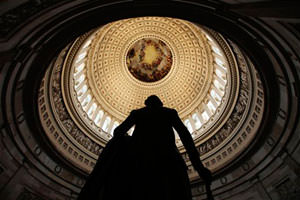Bribe, Vote, Repeat
The votes of lawmakers are so routinely purchased by corporations that it takes a scandal of unusual proportions to generate news coverage.With corporate cash habitually sloshing into campaign coffers, it takes a scandal of unusual proportions to generate news coverage.
I don’t have a sex scandal for you. The foibles of politicians and celebrities titillate. But ultimately, they have little to do with the most enduring and corrosive scandal of our civic life. It unfolds out in the open, day after day.
Millions of dollars slosh from the pockets of powerful corporate interests into the campaign accounts of lawmakers who then write the laws that determine the rules for how these businesses make money — or more money. Then millions more flood in through direct lobbying activity that ensures these same lawmakers are reminded, again and again, that the interests financing their campaigns have a favor to ask.
The nexus of campaign contributions, lobbying and the policy outcomes that do so much to help the powerful and so little to boost millions of average American taxpayers is well known. It used to be considered a worthy story just to point this out from time to time. Now it usually takes a scandal within a scandal — that is, a lawmaker or lobbyist who transgresses even the wide boundaries of the campaign finance and lobbying laws — to generate coverage.
Much of the important and little-heralded work now being done to document this national disgrace is undertaken by nonprofit organizations that have long endeavored to rouse the public and the media to this legal graft.
Most recently, the Sunlight Foundation teamed with the Center for Responsive Politics on a groundbreaking study related to health care overhaul. It shows outside lobbyists (lawyers, consultants and others who do not directly work for a company or trade group) donating to the same lawmakers as clients who have an interest in health care reform. The contributions by the lobbyists enhance the political power of the business organizations — which already are contributing through political action committees, or through executives who organize campaign fundraisers.
Sen. Max Baucus of Montana, the Democratic chairman of the Senate Finance Committee and author of the main health revision bill under consideration in the Senate, was one of the chief beneficiaries. Between January 2007 and June 2009, the study shows, Baucus received contributions from 37 outside lobbyists who represent the Pharmaceutical Research and Manufacturers of America, or PhRMA, the chief drug industry lobby group, and 36 lobbyists who listed Amgen, a drug maker, as a client.
As a group, drug companies were dominant players in the lobbying-campaign contribution complex. In all, 61 members of Congress — 39 senators and 22 House members — got money from 10 or more outside lobbyists whose health care or insurance industry clients also contributed to their campaigns, the Sunlight Foundation says.
“When a lobbyist walks in the door, it’s not just one $500 contribution,” says Larry Makinson, senior fellow at the Sunlight Foundation and chief researcher on the study. “It’s all the money their clients can bring.”
Preliminary results are in: The drug industry, in a private deal with the Obama White House, is expected to contribute only $80 billion in savings in the health care overhaul. Changes that congressional Democrats have long sought — such as allowing the government to negotiate deep discounts for prescription drugs in Medicare, as it does in Medicaid and in the veterans’ health system — have been largely abandoned.
The public seems to have become inured. Each presidential year, much attention is paid to the enormous sums raised and spent by candidates in both parties. Some focus is given to the carnival of corporate interests that the national party conventions have become, or to “independent” groups — loosely affiliated with one party or the other — that spend outrageous sums but supposedly don’t coordinate with the candidates.
Much was made of candidate Barack Obama’s supposed reliance on small, grass-roots donors to fuel his campaign. But Obama also raised as much from large donors as did George W. Bush in 2004, according to Common Cause.
That watchdog group’s list of individuals associated with leading financial companies who gave last year to joint party-candidate fundraising committees is a Who’s Who of the financial crisis: Leading Democratic donors were from Citigroup, Goldman Sachs, JPMorgan Chase & Co., Lehman Brothers. The Republican list includes JPMorgan Chase, Merrill Lynch, Morgan Stanley.
Read this, and weep. Understand that unless the current campaign finance and lobbying systems are demolished — not deftly “reformed” — few public aspirations can survive being smothered by cold cash.
Marie Cocco’s e-mail address is mariecocco(at)washpost.com.
© 2009, Washington Post Writers Group
Your support matters…Independent journalism is under threat and overshadowed by heavily funded mainstream media.
You can help level the playing field. Become a member.
Your tax-deductible contribution keeps us digging beneath the headlines to give you thought-provoking, investigative reporting and analysis that unearths what's really happening- without compromise.
Give today to support our courageous, independent journalists.









You need to be a supporter to comment.
There are currently no responses to this article.
Be the first to respond.